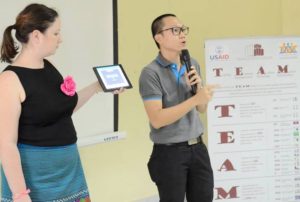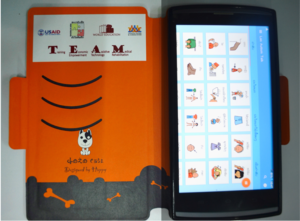On 16 August 2016, the USAID-funded World Education Laos (WEL) TEAM project organized the fifth coordination meeting with 34 people participating including USAID, WEL and TEAM’s 15 sub-recipients. The meeting took place at the Learning House in Vientiane.
Updates from TEAM Laos on overall recent progress were shared. In addition, the 4 TEAMs workshop (Colombia, Congo Ukraine and Laos) which will be held on 12-16 September 2016 was introduced, and the 3 new sub-recipients (the Asian Development with Disabled Persons (ADDP Japan), Inclusive Education Center (IEC) and the Faculty of Medical Technology (FMT)) had the opportunity to present their new TEAM projects. All others sub-recipients presented their latest achievements.
The Lao Association for Autism (AfA) presented their new app on tablet for Augmentative and Alternative Communication (AAC) called Lao Autism Talks that enables persons with autism spectrum disorder (ASD) to communicate and therefore helping to increase participation in family and social life.
Michael Schultze, advisor to the Association for Autism (AfA) said, “This app will increase the reach of AfA. Currently we can only reach the families who can attend the Vientiane Autism Center, but this new app will help us to expand support to more families in the country.” 
In addition, the new communication app drew a lot of attention from other sub-recipients. This innovative device could be useful for people with other types of speech and communication impairments as well.
Associate Professor Dr. Bouathep Phoumindr, from the Faculty of Medical Technology (FMT) said, “This is an amazing tool and I can see the potential for stroke patients to use it. I am excited to see how it can be shared and used in hospitals and in real life in the future for such patients.”
When summarizing the importance of this app development and praising the hard work of AfA and local IT company, Lao IT, Bernard Franck, WEL-TEAM Technical Director, said, “The development of this communication app “made in Laos” is a great example of creative and innovative solutions that can be developed locally to help people with impairment to better function in the day to day life”.
The Quality of Life Association (QLA) presented their database specially designed for the case management of clients and demonstrated how it could be used in generating different data, reports and information about clients simply and effectively.
A volunteer at QLA, Jane Kennedy said, “The development of the database is heavily linked to the way that QLA works {using a case management approach}. They consider what information they need and what they need to share with other services providers for referral and improve the database to capture this.”
Furthermore, Thoummy Silamphan, Executive Director of the Quality of Life Association (QLA) also mentioned that, “We are very happy to share this database with others who are working in a similar field.”
Bernard Franck pointed out that, “The success of this database reflects the commitment of the whole organization (QLA) to deliver and follow up effective services and be able to measure tangible changes in the quality of life of vulnerable people.”
In regards to communication capacity building support, the TEAM project also presented some tips on taking good technical photos/videos in order to help all sub-recipients capture the best photos to help them promote their activities and their achievements. Through the work of the TEAM project and its 15 sub-recipients, persons with disabilities will be empowered throughout Lao PDR.
“The growing number and quality of synergies developed between actors through the TEAM model are amazing, and this meeting resulted in a lot of great exchange of information and good practices among all present.” said Bernard Franck, WEL-TEAM Technical Director.

